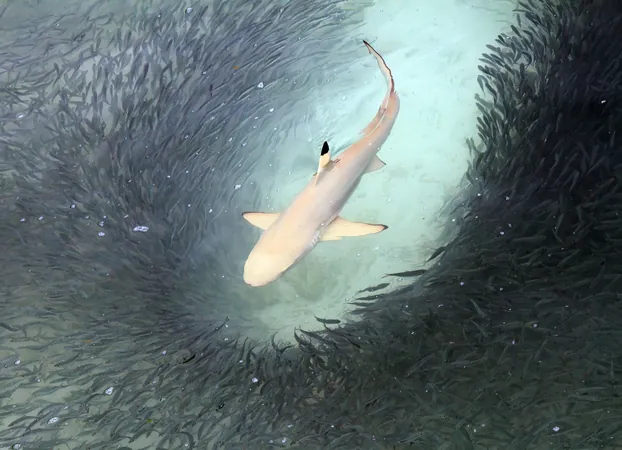
Shark Teeth Under Threat: The Impact of Ocean Acidification
2025-08-29
Author: Li
Shark Teeth at Risk Due to Rising Ocean Acidity
Sharks, nature's precision hunters, rely on their formidable teeth to catch swift prey. However, alarming new research reveals that these iconic teeth may weaken as ocean waters become more acidic, raising concerns about the survival of these magnificent creatures.
The Experiment Behind the Findings
Researchers from Heinrich Heine University Düsseldorf, led by Maximilian Baum, investigated this issue by examining naturally shed teeth from blacktip reef sharks. They conducted tests in lab conditions that simulated current pH levels and projected future acidic conditions.
What the Researchers Discovered
After just eight weeks in acidic water, shark teeth exhibited significant surface damage. In environments with a pH level of 7.3—a projection for the year 2300—cracks and pits appeared more frequently compared to those in water at pH 8.1. The root surfaces of the teeth showed notable corrosion, further jeopardizing their strength.
Why Are Shark Teeth Important?
Shark teeth are not just tools for feeding; they play a critical role in their hunting strategy. The tough outer layer of enamel allows them to cut through prey efficiently, while their constant shedding means that sharks can replace them as needed. However, if ocean acidity remains unchecked, their efficiency could start to dwindle.
Previous Research Insights
Historically, some shark species have demonstrated resilience to moderate acidification, as seen in a 2022 study involving Port Jackson sharks. However, Baum's team focused on more severe acidity, isolating the chemical effects on non-living tissue to reveal how ocean changes could impact these vital hunters.
Broader Implications for Shark Populations
As ocean conditions worsen due to climate change, the consequences could extend beyond tooth integrity. Weaker teeth may lead to difficulties in hunting, potentially affecting overall shark populations. If the energy required for tooth replacement detracts from energy needed for growth and reproduction, the ripple effects on marine ecosystems could be profound.
Looking Ahead: Future Research Directions
To fully understand the implications of these findings, further research is needed. Examining live sharks could reveal whether they can adapt by increasing tooth replacement rates or enhancing fluoride transport to harden new teeth. Such insights would be vital for predicting the future of predator-prey dynamics in marine ecosystems.
Conclusion: A Call to Action
As the threats from ocean acidification intensify, we must recognize that the health of shark populations—and the ecosystems they inhabit—hangs in the balance. Understanding how sharks adapt can help inform conservation strategies crucial for their survival. The findings are detailed in the journal Frontiers in Marine Science.


 Brasil (PT)
Brasil (PT)
 Canada (EN)
Canada (EN)
 Chile (ES)
Chile (ES)
 Česko (CS)
Česko (CS)
 대한민국 (KO)
대한민국 (KO)
 España (ES)
España (ES)
 France (FR)
France (FR)
 Hong Kong (EN)
Hong Kong (EN)
 Italia (IT)
Italia (IT)
 日本 (JA)
日本 (JA)
 Magyarország (HU)
Magyarország (HU)
 Norge (NO)
Norge (NO)
 Polska (PL)
Polska (PL)
 Schweiz (DE)
Schweiz (DE)
 Singapore (EN)
Singapore (EN)
 Sverige (SV)
Sverige (SV)
 Suomi (FI)
Suomi (FI)
 Türkiye (TR)
Türkiye (TR)
 الإمارات العربية المتحدة (AR)
الإمارات العربية المتحدة (AR)